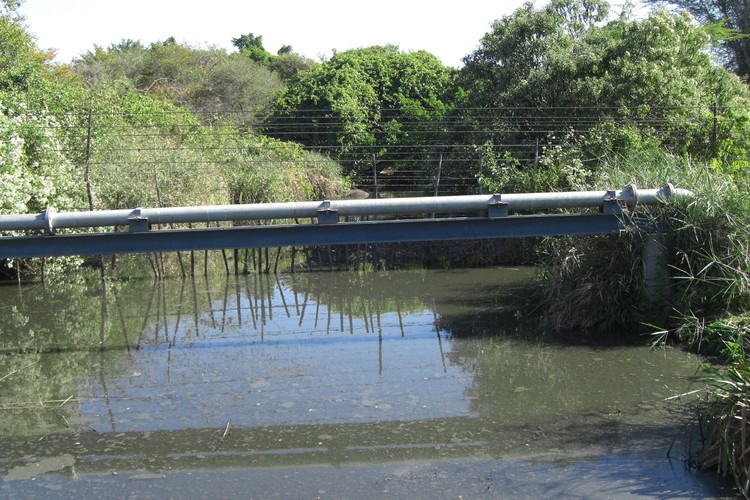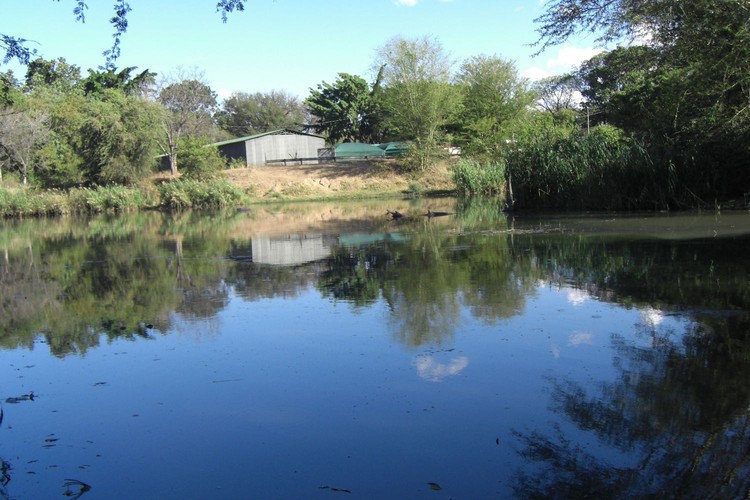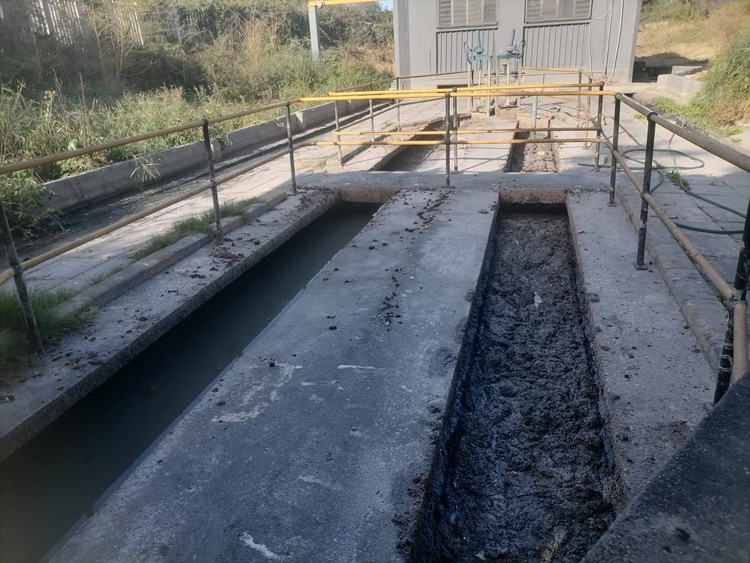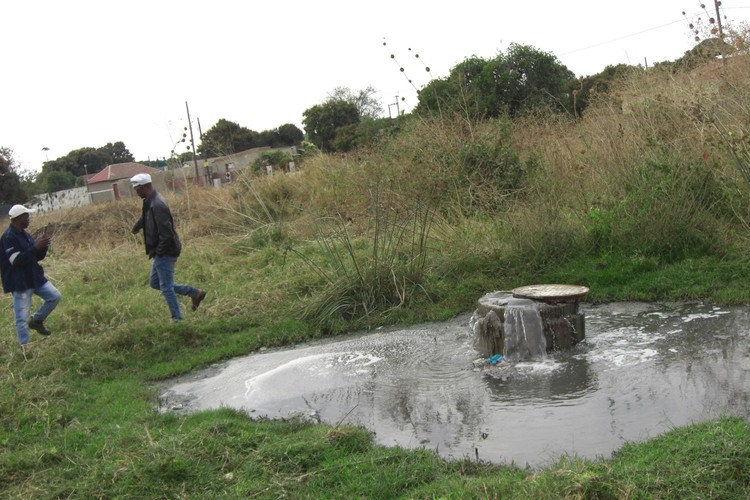Auditor-General investigates sewage flowing into Kruger National Park
But a separate investigation by the Blue Scorpions appears to have stalled
A river in the Kruger National Park, into which raw sewage is flowing from Phalaborwa. Photos: Bernard Chiguvare
- For more than 27 years, raw sewage has been flowing into the Kruger National Park from Phalaborwa. Sewers and pump stations in Phalaborwa are barely working, despite having been refurbished.
- Small business owners say the stench of sewage in town is chasing away customers.
- The Mopani District Municipality says it has allocated R25-million to fix the sewerage system this financial year.
- But it has made similar promises in the past, and the municipality’s finances are in disarray.
The Auditor-General is investigating a growing sewage crisis in Phalaborwa, which borders the Kruger National Park.
GroundUp reported in March that raw sewage has been flowing into the park for at least 27 years, through both the Tshutsi and Ga-Selati rivers, because of Phalaborwa’s broken and failing infrastructure. Sewage spills are a common occurrence in the streets of Phalaborwa town.
The Blue Scorpions, under the Department of Water and Sanitation, have investigated the situation, after criminal charges were laid in 2022 by the Let’s Change Ba-Phalaborwa Community Forum (LCBP). But their findings appear to be gathering dust.
The department said in March that it was awaiting a decision by the National Prosecuting Authority (NPA). But the NPA’s spokesperson Mashudu Malabi told us in July that the matter was still under investigation by SAPS and “when the matter is enrolled we will be able to comment”. SAPS did not comment.
Trevor van Rooyen, vice-chairperson of the LCBP, said that to their knowledge, the NPA is awaiting further information from the Department of Water and Sanitation. But department spokesperson Wisane Mavasa said this week: “The department has referred the matter to law enforcement as previously indicated. We have no control over matters within their purview.”
Stench hangs over new tourist accommodation
We went back to Phalaborwa last week to accompany representatives of the Auditor-General’s office on a tour of the area’s sewage network, together with members of the Let’s Change Ba-Phalaborwa Community Forum.
Inside the park, we visited a site where new backpacker accommodation for the Phalaborwa Wildlife Activity Hub is being built, scheduled to be completed by 1 November. But the site is only a few meters from the Tshutsi River, which is polluted by sewage.
A SANParks representative at the Kruger National Park told GroundUp that the project will likely be delayed by the sewage situation.
Outside the park, there are five emergency dams designed to hold wastewater if the municipal treatment plants fail. They are supposed to be empty, but one of the dams is permanently full of sewage. A herd of hippopotamuses has made it their home.
Five emergency dams are supposed to be empty, but this one is permanently full of sewage and wastewater due to pump failures.
Failing infrastructure
We visited three sewer pump stations in Phalaborwa town that were not working properly, despite having been refurbished in recent years.
In the streets of Phalaborwa, raw sewage spills from manholes. There are several swamp-like areas where dried-up sewage stands stagnant, causing an unbearable stench.
Mopani District Municipality spokesperson Odas Ngobeni told GroundUp that the pump stations are often vandalised and cables are stolen. He said they will be increasing security at the affected pump stations.
Ngobeni also said that residents in some villages have illegally connected toilets to the main sewer line, which causes blockages.
The municipality has replaced the damaged and stolen cables and repaired the stations, and they are currently operational, said Ngobeni.
But the LCBP’s van Rooyen says the stations are still not working properly despite the repairs. The problem has been going on for many years, he says. The forum has requested the municipality to take action “hundreds of times” over the past 15 years, he said.
The Molengraaf pump station, for example, has not worked properly for at least five years, says van Rooyen. “The evidence of this is that the pump station stands in the middle of a sewage swamp and the sewage flows down Molengraaf Street,” he says.
The main sewer in Phalaborwa town is not working optimally and the sewage that goes through it is drying up.
Micro businesses suffer
GroundUp visited several villages on the outskirts of Phalaborwa town, including Makhushane, Mapikiri, Mandela, and Hanivela.
Residents complained about a persistent bad smell caused by sewage streaming from manholes. Community leader Edwin Malatji said that the community has engaged with the municipality, yet there has been no improvement. The sewage problem has only gotten worse, he says.
Small business owners in Mandela Village say they are on the verge of closing down because of the stench.
“I have stopped preparing fresh chips as very few customers are coming to buy them. They are running away from the stink of the raw sewage,” said spaza shop owner Ngwako Monyela, who has had a steady stream of sewage outside his store for more than five months.
A manhole in Mandela village, which is almost constantly overflowing with sewage.
Municipality promises investment
Ngobeni says the municipality has flushed the area’s 4.8-km sewer network and replaced some manholes in town.
But van Rooyen says he is sceptical of this claim. The number of overflowing manholes and sewage spills supports his scepticism.
Ngobeni says the municipality plans to refurbish the rest of the sewage system in Phalaborwa and nearby areas this year. A total of R25-million, which is 10% of the Municipal Infrastructure Grant funding for the 2025/26 financial year, has been set aside for this purpose.
“The financial year has just started on 1 July, and we are yet to appoint contractors, but these are priority projects,” said Ngobeni.
Van Rooyen points out that in past years, the municipality has made similar promises to invest in the sewerage system, but nothing has come of it.
The municipality’s annual reports for 2022/23 and 2023/24 note extensive water pollution across the district and massive underperformance in its sanitation delivery programme.
The municipality received qualified audit opinions in both 2022/23 and 2023/24, which means there were substantial errors in the financial statements, and the auditor general cannot guarantee the accuracy of the statements.
Before 2022, the municipality had several years of disclaimed audit opinions, meaning the financial statements were in such disarray that the auditor-general could not issue an opinion on them.
The municipality has ongoing investigations into irregular expenditure and corruption going back more than a decade.
Support independent journalism
Donate using Payfast

Don't miss out on the latest news
We respect your privacy, and promise we won't spam you.
Next: Cape Union Mart and pro-Palestine activists gear up for court battle
Previous: Sick of waiting, Khayelitsha informal settlements demand electrification
© 2025 GroundUp. This article is licensed under a Creative Commons Attribution-NoDerivatives 4.0 International License.
You may republish this article, so long as you credit the authors and GroundUp, and do not change the text. Please include a link back to the original article.
We put an invisible pixel in the article so that we can count traffic to republishers. All analytics tools are solely on our servers. We do not give our logs to any third party. Logs are deleted after two weeks. We do not use any IP address identifying information except to count regional traffic. We are solely interested in counting hits, not tracking users. If you republish, please do not delete the invisible pixel.




